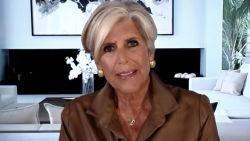Tiffany has been playing catch-up in China, and its CEO isn’t shy about saying it.
The 182-year-old New York jeweler — which was recently purchased by luxury conglomerate LVMH (LVMHF) — entered the mainland in 2001 and started building out its retail network there about six years later, according to Alessandro Bogliolo. He said that was a “little bit late compared to most luxury brands.”
“We lost probably a decade of opportunity,” Bogliolo told CNN Business on Thursday.
Bogliolo called ramping up Tiffany’s presence in China one of his first major decisions as chief executive. Since he took the helm in 2017, Bogliolo has opened several new stores within the mainland, commissioned new jewelry inspired by Chinese designs, set up an online shopping platform in Chinese, and ordered a massive overhaul of the company’s flagship store in Shanghai, which has roughly doubled in size to become the company’s biggest outlet in Asia.
Bogliolo was at that store Thursday to mark its reopening, and he spoke with CNN Business while clutching a shimmering, nine-carat diamond ring. The piece is just one of several high-end jewels — which range in price from $100,000 to tens of millions of dollars each — that Tiffany is now selling in China.
Despite the country’s slowing economy, Bogliolo remains bullish on China, which has been a bright spot for the company with “very strong” sales growth over the last two years, he said.

Chinese shoppers account for a third of global consumption on luxury goods, spending about $115 billion last year, according to consulting firm McKinsey. And while they’ve typically traveled outside of the mainland to buy those items, their habits are now changing as Beijing slashes import taxes and brands reduce the price gap that typically makes their products cheaper in Hong Kong and other cities, according to consultancy Bain and research firm Bernstein.
“Chinese consumers made 27% of their luxury purchases in China in 2018, up from 23% in 2015,” according to a Bain report released in April. “We anticipate that this share will increase to 50% by 2025.”
This time, Tiffany is determined not to get left behind. The emerging trend has prompted the company to move some of its most expensive inventory to China, Bogliolo said. In an attempt to woo established jewelry collectors, high-end pieces that until recently were only shown in China for exhibitions or other events will now be part of the Shanghai store’s permanent collection, according to Bogliolo.
The company is also trying to win over young Chinese shoppers by building a Blue Box Cafe in its Shanghai store. The signature eatery will soon be open to anyone who wants to have breakfast, lunch or dinner at Tiffany’s.
“80% of consumers of luxury in China are millennials,” Bogliolo said. “I really wanted to bring to China, to Shanghai … the flagship experience you can have in New York.”

The expansion is timely for Tiffany. Like countless other businesses, the company has been hit by the ongoing political crisis in Hong Kong, where pro-democracy protests have continued for over six months. The turmoil has hurt the economy and caused retail sales to plunge.
Tiffany (TIF) has experienced challenges in Hong Kong over the last two quarters because of “significant disruptions,” the company told investors earlier this month. But Bogliolo said that “doesn’t change our strategy in Hong Kong.”
Hong Kong has long been one of the capitals of the luxury world, “and I think it will remain as such,” he added.
Bogliolo pointed out that Tiffany recently made a “huge investment” in its Hong Kong flagship store, which is one of the company’s biggest outlets in the region.
Tiffany will also soon need to adjust to life as a subsidiary. LVMH bought the company for $16.2 billion last month, one of the largest acquisitions ever made in the luxury goods sector. The deal is expected to close next year.
The historic deal was “a good sign” of confidence in Tiffany that confirmed the merits of its strategy, said Bogliolo.
Asked about his own future, Bogliolo was more reticent. LVMH has not said whether it will retain the company’s management team after the deal closes in mid-2020, and the CEO demurred when asked if he would stay on.
“You should ask the shareholders,” he said, with a smile.

























